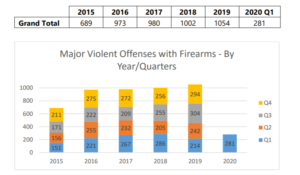Police department inaugural gun violence report shows slight increase in violent offenses
Friday, July 10, 2020 by
Savana Dunning In its inaugural quarterly gun violence report, the Austin Police Department has recorded a slight increase in major violent offenses involving guns compared to the same time last year.
In the summer of 2019, APD released its initial gun crime report – part of an Austin City Council resolution to address gun violence – that analyzed gun crime in Austin from 2014-2018. The resolution was inspired by the Do Not Stand Idly By campaign and the city of Houston’s Commission Against Gun Violence, which was created after the 2018 Santa Fe High School shooting.

Although the total number of violent offenses with firearms in the first quarter of 2020 is nearly the same as it was in 2018, APD reported an increase in murders and non-familial aggravated assaults with guns over the last five years’ first-quarter numbers, and robbery was slightly higher than it was the same time last year.
The resolution directs the city manager to provide a quarterly report on gun violence in Austin, including where the incidents occur, demographic information on individuals involved, and trends across reporting history, as well as any details “determined to be appropriate by city staff.”
The report contains demographic and geographical data for incidents involving firearms, showing downtown Austin as a hot spot for gun violence, with small clusters also occurring north and south along the east side of Interstate 35. The report also showed that Latino males have been the overwhelming majority victims of all gun violence crime types in Austin in 2020 so far, except in instances of familial aggravated assault and murder.
The resolution also asks for information on gun violence perpetrated by people with a history or association with hate groups. However, in its inaugural quarterly report, APD said the agency has no way to determine how many gun violence offenders are or were members of a hate group “due to the protected status of hate speech and statutes prohibiting the collection of intelligence information about hate groups.” The statement references federal regulation 28 CFR Part 23, from the Department of Justice, which states a project cannot collect information on a person’s political, religious or social views, associations or activities unless it directly relates to criminal activity.
The department adds that, as an alternative, it can provide the number of incidents of gun violence committed by members of criminal street gangs, since Texas state law requires law enforcement to track membership of such gangs.
“Although not necessarily considered hate groups, the ‘signature’ of some criminal street gangs may include beliefs and/or practices that attack or malign minorities or other classes of people,” APD said in its report. “The APD Gang Suppression Unit is responsible for all criminal investigations involving gang members and maintaining the Record Management System, which also includes entering a gang member’s information into the statewide database, TXGang.”
This story has been changed since publication to correct a typo. Graph courtesy of the city of Austin.
The Austin Monitor’s work is made possible by donations from the community. Though our reporting covers donors from time to time, we are careful to keep business and editorial efforts separate while maintaining transparency. A complete list of donors is available here, and our code of ethics is explained here.
You're a community leader
And we’re honored you look to us for serious, in-depth news. You know a strong community needs local and dedicated watchdog reporting. We’re here for you and that won’t change. Now will you take the powerful next step and support our nonprofit news organization?









